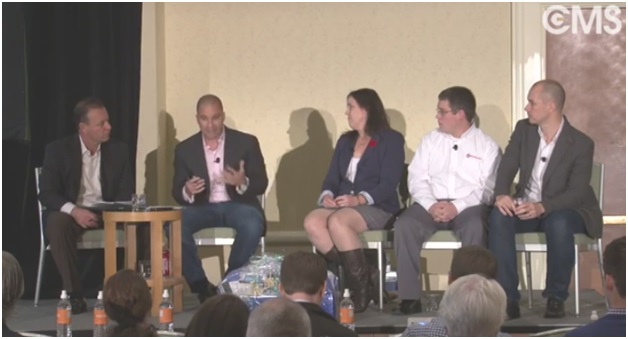3 CMS Experts Discuss Implementation Failures
"IT should just get out of the way and let marketing do its job" - Brian Mckeiver, Bizstream
On Monday, November 10 at 1pm PST, CMS-Connected presented live from the #KenticoConnection conference in Boston MA. It was an incredibly warm and engaged event which saw convention goers file in at the bell to give us a nice crowd to present to. Some even took the time to ask our panel a few excellent questions.
Joining us on stage was Heather MacFayden from Falcon-Software, Michael Kinkaid of eccentricarts and Brian Mckeiver of Bizstream. All of which delivered their thoughts on what fueled the most common CMS implementation failures.

Butch and Scott's chemistry was once again on point as they helped keep the conversation going and naturally, Scott tried to inject some debate into the dialogue to keep things interesting.
Why do so many CMS projects fail?
Heather MacFayden: There are many reasons that a CMS development project might fail, and it's important to distinguish between who is stating that the project has failed. For instance did the project go over budget? Did it not make the timeline? Did it not meet the clients expectations and did the customer end up choosing the wrong technology in the first place? Or did the appropriate post launch activities not happen?
Ultimately the content managers need to be intimately involved in the build and the upper management also must be fully on board with the project and the delivery plan.
On the success side, what makes a successful delivery is a comprehensive plan, realistic client expectations a structured post launch support agenda in order to nurture the project through the inevitable hiccups. It's up to the implementer to provide this support and availability post launch to the client.
Scott: That's a very good point; who defines failure? What was the defined goal and where is dissent originating from? Brian, Michael, what are your customers trying to achieve with their CMS and then your thoughts on failures?
Brian: Our customers are trying to achieve very basic things; that is to increase traffic and leads to their website, convert people. Their site is a tool used to increase sales, it's that simple. It's why we do web and social media; to attract visitors and retain visitors with compelling, rich, fresh content. It's all pretty basic what people want from their website in order to succeed.
Michael: To determine success you also what to be tracking as much as possible. How do you know if a project has failed?You want to have clear and realistic objectives that you can reach. You want to research your traffic baseline from the current version of the website and as the new site development becomes a reality; revisit the traffic and determined whether you've reached the objectives identified earlier in the project.
Scott: I really like that this conversation shifted away from the idea of the project being defined as just a project to implement the CMS and we're tuning into the post launch objectives and relationship nurturing with the client. The CMS's life cycle essentially starts at launch; it begins the long term relationship between the customer and the solution.
Who Should Own the CMS Implementation Project?
Butch: The age old conversation in the organization, who should be responsible for the CMS implementation?
Heather: I think it differs from company to company, but ultimately we need to ensure that we're not playing the exclusion, solo game. This old approach just doesn't work any longer so Marketing and IT must work together to complete the project as a whole. However their roles are changing with marketing making more of the decisions and IT supporting them with the technical implementation. It should be a collaborative approach and will also depend on the availability and technical knowhow of the company resources (implementation team).
Michael: I don't think there is a direct answer to IT or Marketing ownership. The organization needs to assemble the best team of people including decision makers and stakeholders. As Heather mentioned, problems arise when there is a silo'd philosophy of IT Vs Marketing. The company as a whole must be aligned with a far reaching strategy for the CMS objectives and goals. Company wide buy-in can't happen when one department has ownership over the entire project.
Brian: I'm going to take a slightly different approach to this answer. First off, I'm technical (IT), my background is developer/programmer. So the easy answer for me would be IT right, considering my background. However this role has changed dramatically over the last few years that now I would say that It should just get out of the way and let marketing do its job. The tools are so accessible now that it's less about moving 1's and 0's for programmers. Marketing should no longer need to run to a developer in order to create a landing page or start up a campaign. The owner should have the right tool that lets you execute quickly, build the landing page, measure the data - like you said Mike. Once the platform is up and running, IT should step out of the way and let it run.
When Should an Organization Seek Outside Help for their CMS Build Vs Delegating Internally?
Michael: This really depends on the client and their comfort level with the software. Some clients benefit greatly from bringing in a company like ours as soon as possible while other clients are really together and have everything in place prior to the build process. We can often identify which clients will need assistance based on the integrity of the RFP. Lack of business strategy, content strategy, persona development and customer research is a red flag for a lot of extra time helping them to develop these elements. If we don't identify them now, they will show up and stall production a various times during the project and will need our help in order to drive the project forward.
Heather: Organizations implementing these CMS's need to educate themselves to retain a bit of independence and not submit themselves indefinitely to the implementing agency. Tool viability and development should be a collaborative effort between the 2 organizations.
Michael: Exactly, once the CMS is deployed the organization needs to embrace it and learn it since it will be their responsibility to handle the day to day work on the site; build marketing pages, update content, creating rich campaigns and setting them free to track and send back engagement data. They need to commit time and resources towards training their staff so they can properly own their website.
Which Build Methodology Drives Success More Often?
Butch: When considering a build strategy, be it the 'Big Bang' or a phased approach, which methodology drives success more often?
Heather: Well, same answer really, there's no black and white answer and it depends on the clients maturity with their overall strategy. However, from experience, a phased approach generally offers a safer route to a successful deployment. If you attempt too many milestones at once, something will falter. A department's timeline or a content editors training with the system. There will be a bottleneck somewhere and it could cost the company dearly.
Brian: I really like the phased approach. Goals and site requirements can change very quickly and so we also need to adapt quickly. The Big Bang approach is like hiding in a cave and appearing with with something later that the customer hasn't seen or signed off on. With our clients if you can show something visually as soon as possible, they can attach to it and understand how it should work first. Content matters here as well, we need real data so that we can anticipate the clients content needs and build wire frames accordingly. Latin text just isn't a viable testing method anymore.
Michael: We prefer phased approaches especially with medium to large projects where you really must adopt a phased deployment. We can get away with smaller 'Big Bang' type deployments for smaller features but generally, you need a phased approach for medium to large sized projects.
Nice to see the panel agreeing on most points. What do you think? Should IT get out of the way of Marketing as Brian eluded to not so subtly?
Please share your thoughts and keep watching for the second part of this transcript any day now!
Watch the full live episode HERE.

Jade Carter
Jade is a content writer for CMS-Connected, facilitating the needs of the company blog. Bringing 10 years of Search and Digital Marketing to the table, he strives to build informative, relevant and fun editorial posts for the blog feed. Jade is an ultra distance (26.2 miles+) trail runner and lives to run trails in and around his home town of Victoria, BC.